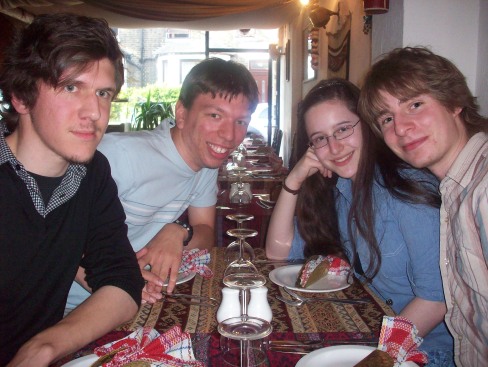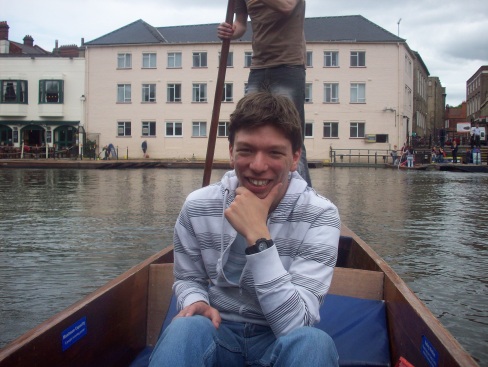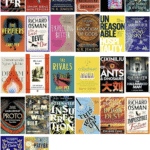So here we are – it’s the night before my last exam. It’s the History of Political Thought to c.1700 paper, which is unusual in the sense that we are guaranteed a question on each specified topic, so I can be certain that tomorrow I’ll be answering questions on Plato, Hobbes and International Law. I’m choosing to interrupt quote-learning for blogging, however, because it’s quite possible that immediately after the exam I’ll enter a euphoric haze that could last for quite a while. Plus I have a rather fun and exciting week lined up, so blogging there may be little!
Waking up to dismal European election results put me in a thoroughly bad mood this morning, albeit solely on the BNP angle. I don’t really mind Tory or even UKIP success with the same gut instinct: after all, there is a common community of political junkies which (I presume) works in a similar way that football fans do. Labour are my tribal ‘team’, and I am bitterly disappointed when they lose on occasions that I really and sincerely don’t believe they deserve to, of which Ken’s defeat is a classic example. But at other times, I think the grinding demands of the political cycle are overwhelming, and oddly enough I feel worse about lack of sizeable Lib Dem or Green gains than Labour’s losses. (Maybe not so oddly: I did vote Green in this election after all.)
In common with the vast majority of people, however, I feel nothing but disgust for the BNP and find any gain on their behalf deeply upsetting. Lucy put it perfectly this morning, and there isn’t really anything to add, but I would say that some of the reassurances we are offered about the far right do nothing to reassure me because they miss the point. No one is expecting the BNP to ever wield effective political power. (Unless there is some major social breakdown, of course, but then all bets are off.) It is perfectly true that very many more people are ‘anti-BNP’ than support it. But it is wishful thinking to believe that ‘anti-BNP’ carries much ideological commitment beyond a distaste for racism. Plenty of people who will never vote BNP nevertheless carry strong reservations about immigration and multiculturalism, even if this is more often just a vague feeling of dissatisfaction rather than a vote-influencing political priority.
And with every gain of the far-right, the temptation to shirk from an active defence of immigration and multiculturalism in favour of ‘tough’ rhetoric becomes ever greater. This will be admirably justified as reaching out and listening to the poor and disaffected, but it merely serves to implicitly confirm the premise that, under all of the nasty racism, the BNP do have a bit of a point.
Well, they don’t. And you might say that I’m bound to say this, given my support for a particularly multicultural vision of what Britain ought to be. It’s true: I do firmly believe that a multicultural society is by far a stronger one. But that’s not my point here. Even if you don’t agree, it is important to accept that BNP policies – or BNP-lite imitation policies – are utterly irrelevant to the real problems at hand. Attempting to change the precise number and composition of individuals in this country will not create jobs, build houses or improve service provision. Whether your neighbour is a Turkish Muslim or a Catholic Pole, you will all look remarkably similar if caught underneath rising sea levels or the blast of a terrorist bomb. The ‘planned economy’ character of a points-based immigration system is bad enough, but let’s not fall any further down this ultimately deeply diversionary route. It’s not just wrong – it’s shamefully neglectful of all of the people who need real help for their problems, not false words.
With four exams down and only one left to go – next Tuesday – there’s been a bit of breathing space for those odd little fragments of life which don’t revolve around exams. We all had an especially good excuse yesterday, Abi’s birthday, and so went out for a (delicious) meal and drinks together with Abi’s friend Heather who is over here visiting from California. (It’s occasions like these where those bits of California knowledge suddenly become very important, such the desolate nature of Fresno – sorry, Fresno ![]() – or the fact that Maine is now, quite shockingly, officially cooler than California.) And I have to say, I do rather love this supremely well-posed group photo:
– or the fact that Maine is now, quite shockingly, officially cooler than California.) And I have to say, I do rather love this supremely well-posed group photo:

Out for Abi’s birthday
Today Owen, Abi, Heather and I went punting, although by some fluke of sheer charm (clearly) we persuaded Owen to do the actual punting whilst the rest of us relaxed. And drank cider. Cambridge really does veer between the extremes of work and relaxation, doesn’t it? Still, it’s becoming increasingly clear with every frantic zig-zag between the river bank why the punt never quite caught on in the rest of the world outside Oxford and Cambridge.

Owen punts us along (I don’t…)

Heather and Abi
Fun musical mix-up moments: a classical Dancing Queen, German Lion King and a punky Apologize. Spotify required.

Stormtroopers!
Clearly, Cambridge is being used as a pilot area for a tough new government policing project…
This is not a footnote:

Not a footnote
Acceptable examples of footnotes include ‘still up for Friday?’, ‘sorry for being so slow to reply’ or ‘and you were rubbish in bed too’. It’s not for grandiose claims: they at least deserve a paragraph or two in the main body of the text. Did Lincoln end the Gettysburg Address with ‘P.S. We should remember that all men are created equal’? I very much think not. Did Hitler end Mein Kampf with a quick ‘And you know who I blame for all of this? The Jews…’ in the afterword?
Talking of Hitler, after watching the reassuringly awful attempt by the BNP to appeal to children, I think I have found a worthy successor to Abbi’s urge to add ‘with the furrrr’ onto the end of things. Y’see, in the video, ‘Billy Brit’ (to which one should of course add ‘the racist shit’) recites an excruciating poem celebrating his ‘heroes’ and rounding off each stanza with ‘and he was white!‘. I now have a habit of appending this to everything. To use the top BBC News headline as an example: ‘Conservative MP Bill Cash has “very serious questions to answer” about his expenses, says David Cameron. And he was white!’
Just back from Bill Thompson’s talk on the ’10 cultures problem’: a restatement of CP Snow’s famous divide between the arts and the sciences, but this time between those who understand computer code and those who don’t. (That’s ’10’ in binary or ‘2’ in decimal; I understand this because Daryl taught me about binary numbers whilst sitting around the dinner table many years ago, all of which rather pays tribute my parents’ ability to persuade clever people to talk to us.) Anyway – the point is that without an understanding of how systems work, people are powerless to make informed decisions about how those systems should be applied within society. And with computing very much at the heart of what we all do, this matters.
I don’t disagree, but I think it’s just one manifestation of a much wider and long-running phenomenon: the tension between specialisation and universality in a world where the former promises great power and the later may be the only real safeguard against its abuse. You can, after all, set up a similar ‘two cultures’ paradigm about many things – between those who understand the process of experimentation and those who don’t, between those who can use rhetoric and those who can’t, between those with mechanical engineering prowess (building, plumbing – the things I tend to call ‘real skills’ ![]() ) and those with none whatsoever. I understand that the challenge is not to turn everyone into an expert on everything but merely to be able to understand what the experts are doing, and how they are thinking, but experience doesn’t seem too encouraging.
) and those with none whatsoever. I understand that the challenge is not to turn everyone into an expert on everything but merely to be able to understand what the experts are doing, and how they are thinking, but experience doesn’t seem too encouraging.
Nevertheless, life is not binary and we don’t have to accept a straight choice between ‘expert’ and ‘know nothing’. CP Snow bemoaned the fact that an ignorance of the Second Law of Thermodynamics would not prove embarrassing to members of the literary elite, and I assume that today many people still wouldn’t have much of an idea. (Including me: I ‘know’ what entropy is in a very general sense, but I couldn’t go into many details.) But, thinking about it, perhaps there are a fair few non-scientists who would have some inkling. And in the networked age it is phenomenally easy to learn just a little bit more. Perhaps the best we can hope for is the mass curiosity, will and means to research new areas of knowledge over a lifetime: it won’t lead to everyone understanding code, but maybe just enough to discuss it at dinner parties.









